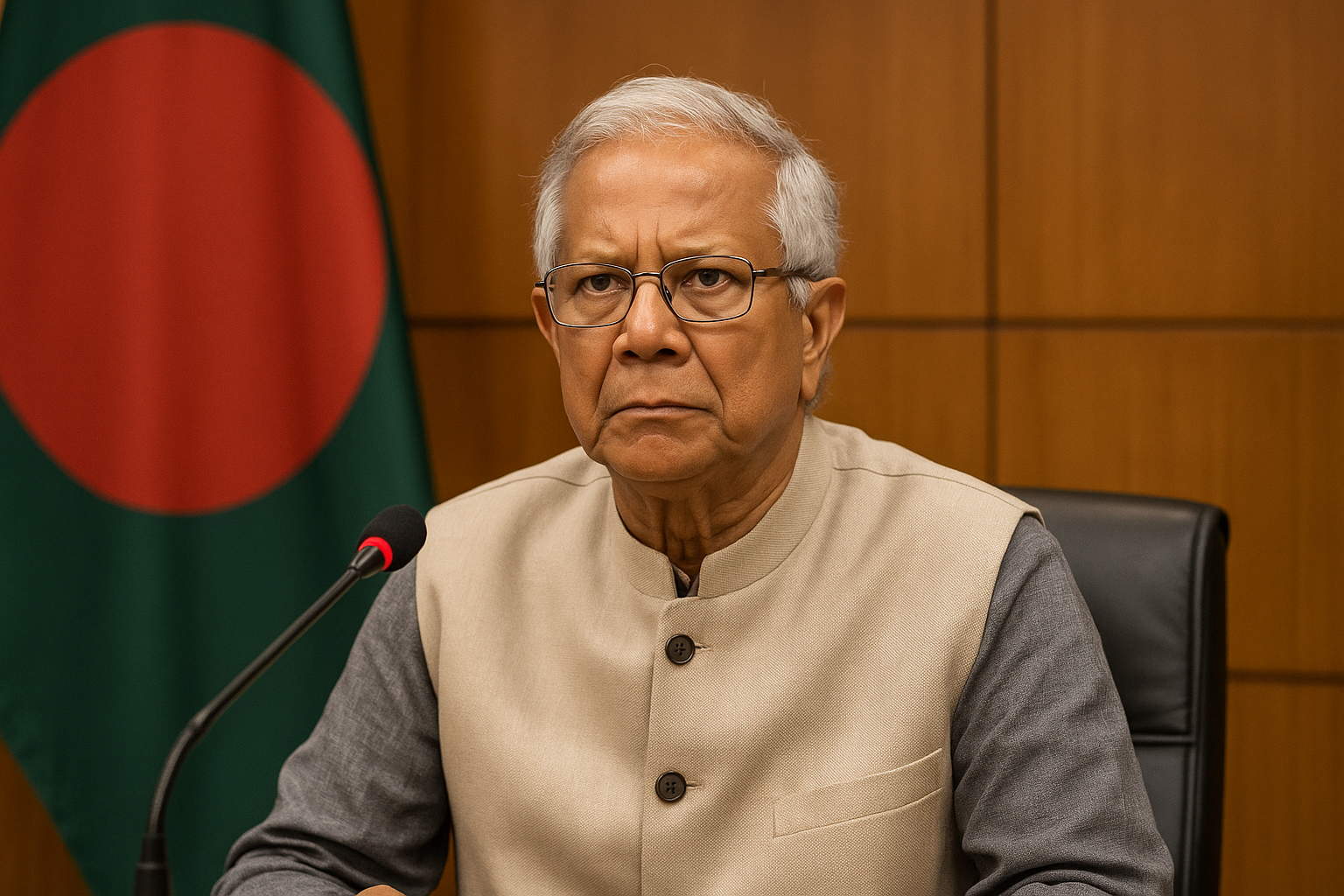When Muhammad Yunus assumed leadership of Bangladesh’s interim administration on August 8, 2024, following unprecedented student-led protests and the resignation of Prime Minister Sheikh Hasina, the nation cautiously anticipated a period of calm, reform, and rapid democratic transition. Mandated by the Supreme Court under the controversial “doctrine of necessity,” Yunus’s government initially presented itself as an apolitical caretaker committed solely to implementing essential reforms and facilitating fair elections.
A year later, Bangladesh stands on the precipice of democratic erosion, witnessing a dramatic departure from the interim administration’s initial pledges. Far from neutrality, the Yunus government has exhibited unmistakable authoritarian tendencies, systematically targeting political opponents, stifling press freedom, compromising judicial independence, and destabilising civil-military relations. Such actions have profound implications not only for Bangladesh’s democratic future but also for regional stability.
Shifting Mandates and Constitutional Ambiguities
Historically, caretaker governments in Bangladesh, in 1990 and 2007-08, served as neutral entities mandated strictly to oversee elections. These interim administrations were constitutionally anchored, providing a critical legitimacy missing in the current regime. Yunus’s government, in contrast, lacks constitutional clarity and inclusivity, fueling legitimacy concerns. The ambitious Constitutional Reform Commission (CRC), formed under his oversight, has faced criticism for marginalising major political factions and minority stakeholders, thereby undermining the credibility and longevity of its reforms.
Selective Justice and Political Repression
The government’s legacy is marked by a crackdown on the Awami League (AL). Since Yunus’s assumption of power, senior AL leaders and activists have faced arrests and judicial pressure. Bans on AL activities and the cancellation of its registration remove meaningful opposition, raising concerns about political exclusion.
Simultaneously, judicial leniency towards Bangladesh Nationalist Party (BNP) leaders fuels perceptions of selective justice. Notably, the acquittal of BNP leader Shahid Uddin Chowdhury Annie in June 2025 from long-standing charges of explosive possession underscores suspicions of politically motivated judicial interference.
Press Freedom Under Siege
Bangladesh’s media landscape has suffered severe repression under the interim regime. Over 350 documented instances of harassment, violence, and legal action against journalists highlight the administration’s efforts to control public discourse and silence dissent. Channels like Somoy TV have experienced orchestrated mob attacks and court-enforced management takeovers, chilling independent journalism.
The enactment of stringent cybersecurity and data protection ordinances has intensified censorship, eroding press autonomy under the guise of national security. International watchdogs, including Reporters Without Borders and the Committee to Protect Journalists, have strongly criticised the regime, highlighting Bangladesh’s alarming decline in global press freedom rankings.
Judicial Independence Compromised
The integrity of Bangladesh’s judiciary faces unprecedented challenges under Yunus’s tenure. Despite promises of reform, executive interference continues to undermine judicial autonomy, as evidenced by politically driven appointments and opaque court proceedings. The recently introduced Supreme Judicial Appointment Ordinance (2025), ostensibly designed to safeguard judicial independence, is marred by serious transparency flaws, subjective criteria, and the controversial exclusion of representation from the legal community.
Legal experts and the national Bar Council express deep concerns about the ordinance’s potential to consolidate political influence rather than reduce it. Without genuine transparency and inclusive reforms, Bangladesh’s judiciary risks prolonged institutional weakness and compromised credibility.
Institutional Integrity and Civil-Military Tensions
Institutional autonomy has deteriorated significantly, as evidenced by politically motivated interference in pivotal bodies, including the Election Commission, Anti-Corruption Commission, and Human Rights Commission. However, perhaps most alarming is the growing friction between civilian authorities and Bangladesh’s military leadership.
Army Chief General Waker-uz-Zaman has repeatedly and publicly urged the Yunus administration to expedite elections, asserting that delays pose a threat to national security and stability. Disputes over critical issues—including defence budget reductions, border policy with Myanmar, and controversial reinvestigation of convicted mutineers—have strained civil-military relations, leading to increased internal discord and weakening institutional coherence. These divisions, if unresolved, risk destabilising national security and governance frameworks at a critical juncture.
International and Domestic Backlash
Domestically, sustained public protests from political factions, civil society groups, and human rights activists underscore widespread disillusionment with the interim government’s increasingly authoritarian tactics. On the international front, prominent global actors—including the United Nations, the European Union, the United States, and international human rights organisations—have expressed deep concern, calling for the immediate restoration of democratic norms, press freedom, and due process.
International experts caution that Bangladesh faces potential diplomatic isolation, economic vulnerabilities, and punitive international measures if the regime persists on its current authoritarian trajectory. The stakes extend beyond domestic politics, potentially destabilising regional security frameworks in South Asia.
Long-term Implications: A Crossroads for Democracy
Bangladesh now confronts a critical democratic crossroads. The Yunus administration’s persistent violations of judicial independence, press freedom, political pluralism, and civil-military harmony threaten irreversible erosion of democracy. Without immediate corrective measures, authoritarian consolidation could become entrenched, reversing decades of democratic progress.
The urgent restoration of judicial impartiality, comprehensive media freedoms, transparent and inclusive political processes, and firm electoral commitments constitute essential steps toward achieving stability and credibility. Moreover, a robust, unified international response can reinforce accountability and support Bangladeshi civil society’s democratic aspirations.
Preserving Democratic Integrity
Bangladesh’s interim government, initially embraced as a vehicle for democratic renewal, has instead become an instrument of systemic repression and institutional degradation. Its authoritarian drift undermines domestic stability and regional security, necessitating swift and decisive intervention from both national stakeholders and the international community.
Restoring Bangladesh’s democracy requires concrete actions, such as reestablishing judicial independence through transparent appointment processes and inclusive legal reforms. Protecting press freedoms by rescinding oppressive laws and ceasing the persecution of journalists. Ensuring political inclusion by reversing partisan bans and facilitating genuine multiparty elections, and accelerating a transparent electoral timeline endorsed by civil-military consensus to regain public and international legitimacy.
Bangladesh’s democracy hangs in a precarious balance. The actions taken today will determine whether the nation reclaims its democratic potential or descends further into authoritarian darkness. The stakes—for Bangladesh, the region, and international democratic principles—could not be higher.

